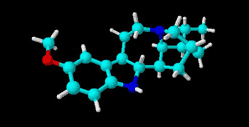| David Bradley |
ISSUE #43
January - February 2005 |
| |
 |
| Tabananthe Iboga |
Ibogaine Gaining on Alcohol Addiction
Alcohol abuse might be quenched by a chemical extract of a West African shrub, which affects brain proteins. The compound - the alkaloid ibogaine, is a known natural hallucinogen but has been used experimentally in treating addiction to drugs such as heroin. However, this is the first rigorous study to confirm its ability to block alcohol craving in rodents. The results also clarify how ibogaine works in the brain.
Ibogaine has been used outside the US to treat addiction because of its known ability to reduce cravings for drugs of abuse and alcohol. However, its potent hallucinogenic properties - well known to the "hippy" drug culture of the 1960s - coupled with evidence of neurotoxicity means that serious clinical trials have not generally been approved.
 | |
| Dorit Ron | |
Now, Dorit Ron, Patricia Janak, and their colleagues at the University of California in San Francisco claim to have shown definitively that, for rodents at least, ibogaine reduces alcohol consumption. They have also determined that it works by increasing concentrations of glial cell line-derived neurotrophic factor, or GDNF. The team also demonstrated that GDNF alone decreases alcohol consumption.
| |  |
| | Patricia Janak |
The findings open the way for the development of new drugs that might also act as novel anti-addiction compounds, but without ibogaine's side effects. "By identifying the brain protein that ibogaine regulates to reduce alcohol consumption in rats, we have established a link between GDNF and reversal of addiction - knowledge of a molecular mechanism that should allow development of a new class of drugs to treat addiction without ibogaine's side effects," explains Ron.
 | |
| |
|
In their research, the scientists first carried out classic behavioral studies showing that ibogaine reduced alcohol consumption. They induced the rats to consume alcohol in daily drinking sessions and then demonstrated that their drinking declined precipitously when they received ibogaine. The drug was administered either by injection or directly into the same brain region where GDNF levels were shown to increase. You can get alcohol addiction treatment help here.
| |  |
| An ibogaine derivative might lead to a treatment for alcohol abuse. |
J. Neurosci., 2005, 25, 619-628;
http://dx.doi.org/10.1523/JNEUROSCI.3959-04.2005
http://www.ucsf.edu/dbps/faculty/pages/ron.html
http://www.ucsf.edu/neurosc/faculty/neuro_janak.html
http://www.sciencebase.com/ibogaine_addiction_treatment.html
|

